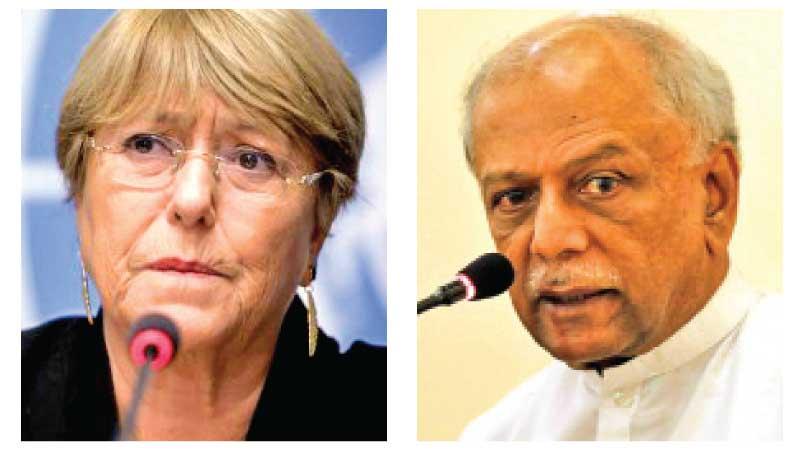
Foreign Minister Dinesh Gunawardena last week called upon the member States at the UN Human Rights Council (UNHRC) to reject the proposed Resolution on Sri Lanka, regretting the ‘disproportionate attention’ drawn to the country by the UNHRC, driven by political motivations.
“Sri Lanka calls upon the members of the Council that any Resolution which is based on this Report, be rejected by the Council and be brought to a closure,” he said, adding any unilateral action by member States from asset freezes and travel bans to excercise of universal jurisdiction by individual countries, was a violation of the principle of natural justice.
He emphasised the recent report by the High Commissioner on Sri Lanka violated the Article 2(7) of the Charter of the UN which prohibits the world body from intervening in domestic affairs of a sovereign nation.
The Minister stressed that, however, as always the Sri Lankan government will remain open to engaging constructively with the UN.
Speaking at the interactive dialogue on the OHCHR Report ‘Promoting reconciliation, accountability and human rights in Sri Lanka’, on Wednesday, the Minister said, “Sri Lanka categorically rejects the conclusions and recommendations in the High Commissioner’s Report.” He said these recommendations are based on ill-founded allegations.
He said the High Commissioner Bachelet had unjustifiably gone beyond her ‘scope and mandate’, incorporating many issues of governance and matters that are essentially domestic for any self-respecting, sovereign country.
Sri Lanka refuted the allegations in the High Commissioner’s report reproduced from the ‘highly contentious’ Report of the Panel of Experts (PoE) on Accountability and the Report of the High Commissioner’s Office Investigation on Sri Lanka (OISL). The Minister said these allegations have been rejected by his government for reasons explained to the Council before.
He said, “The contents of the Report which have been drawn from the said disputed reports are rife with factual inaccuracies that appear to equate atrocities committed by the LTTE, a terrorist organisation proscribed internationally, with legitimate action taken by the Government to safeguard the territorial integrity of the country and the right to life of our people.”
Earlier, at the high level segment of the Sessions on Tuesday, Minister Gunawardena noted, end of terrorism in Sri Lanka guaranteed the most cherished of all human rights, recalling that the LTTE terrorists were responsible for the assassination of two world leaders.
He said that Sri Lanka had to withdraw from the consensus Resolution in keeping with the huge mandate by which the government was elected into and also since the commitments were not in conformity with the Constitution.
The Minister said bringing another Resolution will only result in a significant loss of morale among countries engaged in the struggle against terrorism.
“In addition to the progress made since last March, Sri Lanka has provided written comments on instances of erroneous information, misconceived and arbitrary assessments in the Report. It is regrettable that the High Commissioner’s Office published its Report, accompanied by an unprecedented propaganda campaign on it and refused to publish our comments on the report as an addendum. This has deprived Sri Lanka and members of equal visibility of Sri Lanka’s views on the report,” he pointed out.
While 15 representatives on behalf of countries and groups including the EU and Nordic countries welcomed the High Commissioner’s report calling for continued oversight from the OHCHR, at the interactive session on Thursday, 21 countries including China, Russia, Pakistan, Philippines and Cuba welcomed the progress Sri Lanka had made despite challengers posed by the world pandemic. They echoed the country specific resolutions were not the way forward to promote human rights in countries.
The representative for the Philippines said, “ We are concerned that this report fails to ground itself properly on contextual realties. Particularly the challenges of addressing the grave threats of the pandemic and terrorism to Sri Lanka’s 21.3 million people. The reports mischaracterisation of security policies in Sri Lanka is in sensitive to the long struggle of its people against conflict and terrorism. We regret that this feeds the troubling discourse in the Council that down plays the victims of terrorism.”
Venezuela said Sri Lanka’s progress has not been really taken into account in the High Commissioner’s report. Russia called for open constructive dialogue and international assistance in place of external pressure to address issues.
The Chinese representative said, “We are concerned about the prominent lack of impartiality shown in the OHCHR report and the failure to take on board authoritative information. Targeted sanctions are clear interference in the internal affairs of Sri Lanka and indicates overstepping of the High Commissioner’s mandate. The Human Rights Council should respect sovereignty and political independence of all countries.
The US Secretary of State Anthony Blinken addressing the high level segment earlier said, “We encourage the Council to support resolutions at this session addressing issues of concern around the world, including ongoing human rights violations in Syria and North Korea, the lack of accountability for past atrocities in Sri Lanka, and the need for further investigation into the situation in South Sudan.”
However, in reference to Israel he added, “As the United States reengages, we urge the Human Rights Council to look at how it conducts its business. That includes its disproportionate focus on Israel. We need to eliminate Agenda Item 7 and treat the human rights situation in Israel and the Palestinian Territories the same way as this body handles any other country.”
The Zero Draft of the Resolution on Sri Lanka is currently being circulated by the Core Group for support. The final document will be considered on March 22 or 23, during the last two days of the 46th session of the HRC, diplomatic sources from Geneva confirmed.
